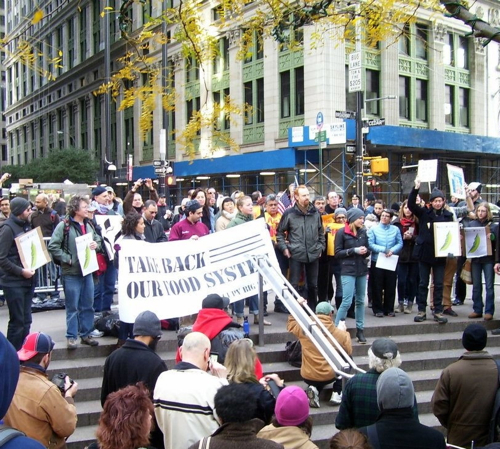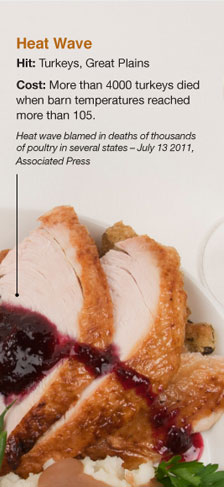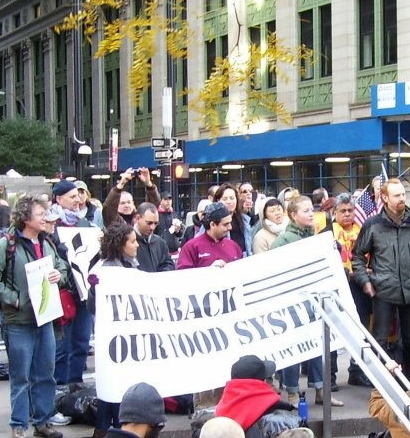 The Occupy Big Food rally at Zuccotti Park on Saturday.“Whose food? Our food!” This was the rallying cry at the first Occupy Big Food event on Saturday in Zuccotti Park. The rally, which I led with Erika Lade, a graduate student in NYU’s Food Studies program, gathered about 100 people with the goal of connecting the larger Occupy Wall Street effort to the food justice movement.
The Occupy Big Food rally at Zuccotti Park on Saturday.“Whose food? Our food!” This was the rallying cry at the first Occupy Big Food event on Saturday in Zuccotti Park. The rally, which I led with Erika Lade, a graduate student in NYU’s Food Studies program, gathered about 100 people with the goal of connecting the larger Occupy Wall Street effort to the food justice movement.
NYU professor of Nutrition and Food Studies Marion Nestle was the event’s featured speaker. Although Nestle was intimidated at the prospect of using the human microphone for the first time, she picked up the unusual speaking technique quickly. “I’m an academic who studies social movements,” she told the crowd. “Occupy Wall Street is a social movement. Occupy Big Food is a social movement.”
Occupy Big Food has three main goals: To raise public consciousness, to put pressure on food corporations to change their destructive practices, and to organize and unify Americans in an alternative food system. As I told the audience that day: We have two choices. We can create our own food system now, or we can watch as corporations continue their destruction of our food, our environment, our health, and our economy.
As we have seen at Occupy Wall Street, collective action is crucial. We were there with the hope that the food movement can follow Occupy Wall Street’s model to unify individual voices into one collective roar.
For social and political movements to make real change they must reach across social boundaries, especially race or class-based ones. Bill Granfield, president of the Unite Here Local 100 food service workers union, came to the rally with local 100 members who work in the cafeterias and executive dining rooms of Goldman Sachs, Citigroup, Merrill Lynch, and JP Morgan Chase. These companies are under contract with some of the largest food distributors in the world, such as Sodexo, Compass, and Aramark. Granfield describes the workers as “New York’s working people of Wall Street.”
“If we are going to have a real food movement it has to include real, sustainable jobs for workers,” he said in a recent interview.
Justice and equality was also at the heart of Ryan Ehrhart’s speech on Saturday. Ehrhart is a PhD candidate at CUNY, who focuses on food sovereignty. He began by addressing a recent write-up about Occupy Big Food on the National Public Radio website which used the term “foodies.” The word, he says, “has connotations of elite consumption.” “This is a food justice movement. This movement is about getting a food system that prioritizes healthy food for all people, regardless of income.”
Chef Erica Wides, host of Let’s Get Real: The Cooking Show About Finding, Preparing and Eating Food on the Heritage Radio Network, has her own word to describe what takes place in the industrial food system. At the rally, she suggested a new term entirely. “Big Food isn’t feeding us food. They’re feeding us something else,” Wides said. “I call it ‘foodiness.’ Like Stephen Colbert’s ‘truthiness,’ which isn’t about truth, foodiness is not food. Like veggie puffs with no vegetables; fruit bars with no fruit; taco meat with no meat. The way to make Big Foodiness change is to do so from the ground up: Eat vegetables, not veggie puffs. Eat fruit, not fruit bars.”
Those of us who went down to Zuccotti Park on Saturday believe that healthy food is at the root of a healthy democracy. And we are not the first to say so. In 1937, Franklin D. Roosevelt said, “A nation that destroys its soil, destroys itself.” I believe that we are in the final hours, and we must prevent this from becoming true.
In her closing remarks, my co-organizer Erika Lade summed up the sentiment at the rally when she said, “It’s time for the food movement to stop being nice, stop being elitist, and start being radical.”




